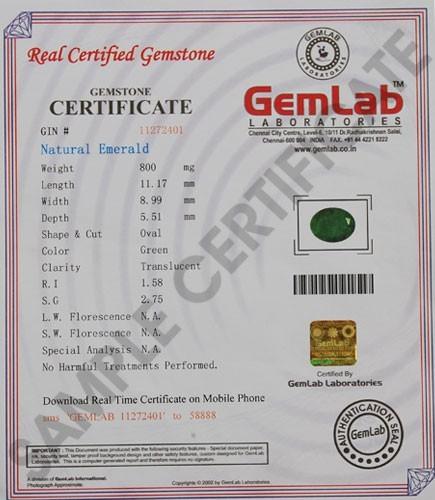Gemstones have been cherished for their beauty and rarity for centuries. From the glittering diamonds that adorn engagement rings to the vibrant sapphires, rubies, and emeralds set into exquisite jewelry pieces, gemstones hold a special place in human culture and history. However, as the market for these precious stones has grown, so has the potential for fraud and misrepresentation. This is where gemstone certification comes into play. In this blog, we will delve into the world of gemstone certification, exploring what it is, why it is important, and how it benefits both buyers and sellers in the gemstone market.
What is Gemstone Certification?
Gemstone certification is the process by which a gemstone is evaluated and documented by a recognized gemological laboratory. This certification provides a detailed report on the gemstone’s characteristics, including its type, color, clarity, cut, carat weight, and any treatments it may have undergone. This certification aims to provide an unbiased and accurate assessment of the gemstone’s qualities, ensuring transparency and trust in the transaction.

Key Components of a Gemstone Certificate
A gemstone certificate, often referred to as a gemological report, typically includes the following information:
1. Identification: The type of gemstone (e.g., diamond, sapphire, ruby, emerald) and any relevant details such as whether it is natural or synthetic.
2. Weight: The carat weight of the gemstone.
3. Dimensions: The measurements of the gemstone, usually in millimeters.
4. Cut: The quality of the cut affects the gemstone’s brilliance and overall appearance.
5. Color: A detailed description of the gemstone’s color, including hue, tone, and saturation.
6. Clarity: An assessment of the internal and external characteristics of the gemstone, such as inclusions and blemishes.
7. Treatments: Any treatments the gemstone has undergone to enhance its appearance, such as heating, filling, or irradiation.
8. Origin: In some cases, the geographic origin of the gemstone may be included if it is known.
9. Photographs: High-quality images of the gemstone.
10. Security Features: Holograms, barcodes, or other security measures to prevent forgery.
Ensuring Authenticity
One primary reason for obtaining a gemstone certification is to ensure the authenticity of the gemstone. The market is flooded with synthetic and imitation stones, and even seasoned buyers can sometimes be deceived by a convincing fake. A certification from a reputable laboratory guarantees that the gemstone is genuine and provides details about its natural or synthetic origin.
Assessing Quality
Gemstone certification provides an objective assessment of the quality of the gemstone. This includes detailed evaluations of the gemstone’s color, clarity, cut, and carat weight. For instance, the GIA’s diamond grading system, which assesses diamonds on a scale from D (colorless) to Z (light color), is widely recognized and trusted. Buyers can make informed decisions based on these standardized evaluations, ensuring they get what they pay for.
Verifying Treatments
Many gemstones undergo treatments to enhance their appearance. Common treatments include heat treatment for sapphires and rubies, fracture filling for diamonds, and irradiation for color changes in various stones. While these treatments can improve a gemstone’s aesthetic appeal, they can also affect its value. A gemstone certificate will disclose any treatments the stone has undergone, allowing buyers to understand exactly what they are purchasing.
Protecting Investment
For many, purchasing gemstones is not just about acquiring beautiful jewelry but also about making a financial investment. Gemstones can appreciate value over time, contingent on their quality and authenticity. A certified gemstone is more likely to retain its value and can be more easily resold or insured. In contrast, an uncertified gemstone might face skepticism and lower valuations in the market.
Legal Protection
Gemstone certification also provides legal protection for both buyers and sellers. In a dispute over the quality or authenticity of a gemstone, a certified report serves as a legally recognized document that can be used to resolve the issue. This is particularly important in high-value transactions involving significant sums of money.
The Certification Process
Submission
The first step in the certification process is submitting the gemstone to a recognized gemological laboratory. This can be done by the gemstone’s owner, a jeweler, or a gemstone dealer. The stone is typically accompanied by a submission form that includes details such as the owner’s contact information and any known information about the gemstone.
Evaluation
Once the gemstone arrives at the laboratory, it undergoes a thorough evaluation by a team of trained gemologists. This evaluation includes several stages:
1. Initial Examination: The gemstone is examined under a microscope to identify its internal and external characteristics. This includes looking for inclusions, fractures, and other features that can affect its clarity.
2. Measurement and Weight: The gemstone’s dimensions are measured, and its carat weight is determined using precise scales.
3. Color Grading: The gemstone’s color is assessed using standardized lighting and comparison stones. This evaluation considers the hue, tone, and saturation of the color.
4. Cut Evaluation: The quality of the gemstone’s cut is evaluated, including the symmetry, polish, and proportions. For diamonds, this involves assessing the cut grade, ranging from Excellent to Poor.
5. Treatment Detection: Advanced techniques such as spectroscopy, luminescence, and chemical analysis are used to detect any treatments the gemstone may have undergone.
6. Origin Determination: In some cases, laboratories may attempt to determine the geographic origin of the gemstone based on its chemical composition and inclusions.
Report Generation
After the evaluation, the laboratory generates a detailed report that includes all the findings. To prevent forgery, this report is printed on secure paper with various anti-fraud features, such as holograms and barcodes. The gemstone is returned to the owner along with the certificate.
Benefits of Gemstone Certification
For Buyers
Peace of Mind: Buyers can be confident that the gemstone they purchase is genuine and accurately described. This reduces the risk of fraud and ensures they get value for their money.
1. Informed Decisions: Buyers can make more informed decisions with detailed information about the gemstone’s quality and any treatments it has undergone. This is particularly important when comparing gemstones and assessing their relative value.
2. Resale Value: A certified gemstone is easier to resell and typically commands a higher price in the secondary market. Potential buyers are more likely to trust and pay a premium for a gemstone with a reputable certification.
3. Insurance: Insuring a gemstone is much easier with a certification. The certificate provides all the necessary details for the insurance company to assess the gemstone’s value and provide adequate coverage.
For Sellers
1. Credibility: Sellers who offer certified gemstones can establish themselves as trustworthy and credible. This can attract more customers and increase sales.
2. Higher Prices: Certified gemstones can command higher prices than uncertified ones. Buyers are willing to pay a premium for the assurance of quality and authenticity.
3. Reduced Returns: A certification that clearly outlines the characteristics of the gemstone reduces the likelihood of disputes and returns. Buyers know exactly what they are getting, which reduces the chances of dissatisfaction.
4. Market Differentiation: In a competitive market, offering certified gemstones can set a seller apart. It shows a commitment to quality and transparency, which can be a significant selling point.
Common Misconceptions About Gemstone Certification
Certification Guarantees Value
One common misconception is that certification guarantees a high value for a gemstone. While certification ensures the gemstone’s authenticity and provides a detailed assessment of its qualities, but it does not automatically make it valuable. The value of a gemstone is determined by market demand, rarity, and other factors. Certification provides the necessary information for assessing value but does not set it.
Certification is Only for Expensive Gemstones
Another misconception is that certification is only necessary for high-value gemstones. While it is true that certification is often sought for expensive gemstones, it can be beneficial for gemstones of all values. Even for lower-priced gemstones, certification provides assurance of authenticity and quality, which can enhance their appeal and marketability.
Certification is a One-Time Process
Gemstone certification is not necessarily a one-time process. Over time, a gemstone may undergo changes such as additional treatments or damage. It is advisable to have the gemstone re-evaluated and re-certified periodically, especially if it is being considered for resale or insurance purposes. This ensures that the certification remains accurate and up-to-date.
Increased Consumer Awareness
As consumers become more educated about gemstones and the certification process, the demand for certified gemstones is likely to increase. Buyers are becoming more discerning and seeking assurance of quality and authenticity before purchasing. This trend will drive the gemstone market towards greater transparency and accountability.
Gemstone certification is an essential aspect of the modern gemstone market. It provides a reliable and objective assessment of a gemstone’s quality and authenticity, benefiting buyers and sellers. By ensuring transparency and trust in transactions, certification enhances the value and marketability of gemstones. As technology advances and consumer awareness grows, the importance of certification is only expected to increase. Whether you are a buyer seeking to make an informed purchase or a seller looking to establish credibility, gemstone certification is a valuable tool to help you navigate the complex and fascinating world of gemstones.

